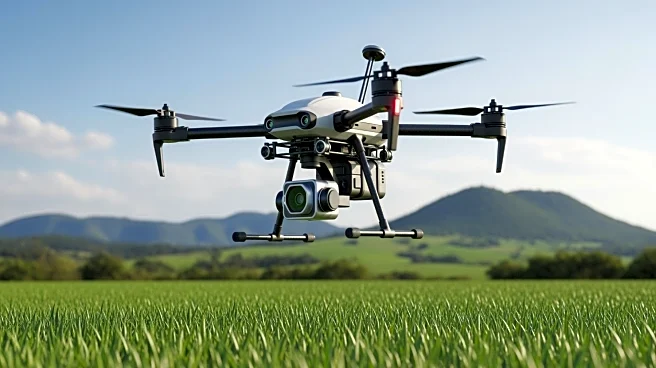What's Happening?
The Mexico agriculture drones market is expected to grow significantly, reaching USD 374 million by 2033, according to a report by IMARC Group. The market, which was valued at USD 40.6 million in 2024,
is projected to expand at a compound annual growth rate (CAGR) of 27.98% from 2025 to 2033. This growth is driven by the increasing adoption of drones for precision farming, crop monitoring, soil analysis, and irrigation management. The report highlights the rising demand for cost-effective and sustainable farming practices, supported by government initiatives promoting digitalization in agriculture. The integration of advanced imaging technologies and AI in drones is also contributing to the market's expansion.
Why It's Important?
The growth of the agriculture drones market in Mexico is significant for the agricultural sector, as it promises enhanced efficiency and sustainability in farming practices. By adopting drone technology, farmers can optimize crop yields and resource management, which is crucial for addressing food security challenges. The market expansion also indicates a shift towards digital agriculture, which can lead to increased productivity and reduced environmental impact. As more farmers embrace drone technology, the agricultural industry could see improved operational efficiency and a reduction in costs associated with traditional farming methods.
What's Next?
The future of the Mexico agriculture drones market will likely involve further technological advancements and increased adoption rates among farmers. Regulatory frameworks and farmer education will play critical roles in facilitating this growth. As drone technology evolves, addressing issues such as data privacy and airspace regulations will be essential to ensure safe and effective usage. The market is expected to witness consolidation among key players, offering comprehensive solutions that integrate hardware and software for optimal agricultural productivity.
Beyond the Headlines
The expansion of the agriculture drones market could lead to broader implications for the agricultural sector, including ethical considerations related to data privacy and the impact of digitalization on traditional farming communities. The integration of AI and advanced imaging technologies in drones may also raise questions about the role of technology in agriculture and its potential to transform farming practices.









